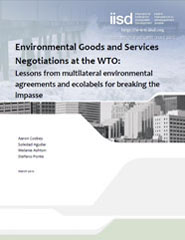Abstract

The successful outcome of current negotiations under the World Trade Organization’s (WTO) Doha Mandate could provide market incentives for the dissemination of climate-friendly technologies through the reduction or elimination of barriers to trade in environmental goods and services (EGS). However, the talks in this area are deadlocked, in part due to disagreements on the definition of environmental goods and the scope of goods to be liberalized. This paper uses the experience from environmental conventions and eco-labeling schemes to derive options for creating and managing a living list of environmental goods.
The Convention on International Trade in Endangered Species (CITES), for example, requires scientific backing for any proposed additions to the list and has a relatively fast and efficient mechanism to vote on new additions or deletions. A required two-thirds majority to include products in the list, combined with the possibility to make reservations to specific products in the list, could be used in EGS negotiations to provide the flexibility necessary to allow a progressive process for liberalizing trade in environmental goods. To encourage the maximum level of liberalization as an end result, reservations could be: limited in time, restricted to developing countries only and encouraged to be withdrawn at all stages of the process.
Other more recent MEAs, such as the Rotterdam Convention on Prior Informed Consent (PIC) (dealing with the trade of hazardous chemicals) and the Stockholm Convention on Persistent Organic Pollutants also provide important insights on the management of listed goods for special treatment under the trade regime. The PIC Convention relies on the submissions of Parties for additions to the list, and has a scientific review body tasked with assessing the submissions against specific criteria, and forwarding recommendations to the Parties. The example of the Convention’s Chemical Review Committee might be of use to the WTO in establishing its own such technical advisory body. All such bodies have explicit environmental and social objectives by which to evaluate candidates for the list – another practice from which the WTO could profit.
EGS negotiations can also draw significant lessons from eco-labelling experiences. First, it is of paramount importance to assess the actual environmental merits of a good against its clamed merits. Second, it is important to assess any potential impacts that would discriminate against small and medium-sized producers, or against exporters from certain regions. Lessons in governance are also important. For example, the Marine Stewardship Council (MSC) ecolabel features inclusive governance features, which allow the inclusion of views and influence from developing countries and small producers.
It is also important to regularly update any list, as technological progress will make today’s green goods into tomorrow’s dinosaurs. The Energy Star ecolabel has a set of criteria that prevent its specifications from becoming outdated and conducts regular reviews of the products it covers, with updates every few years for key products. It also has procedures for sunsetting those products that are no longer appropriate for listing. Both of these features would need to be a part of any WTO regime for EGS that included goods based on their
relative merits.
These recommendations, among others included in the study, would allow the creation of an EGS regime that provides enough policy space for developing countries to develop their own technological alternatives for greener production, while giving a strong push to international trade in those technologies that may pave the way to a low carbon economy.
To read the full article, visit:
http://www.iisd.org/pdf/2009/bali_2_copenhagen_egs_lessons.pdf

